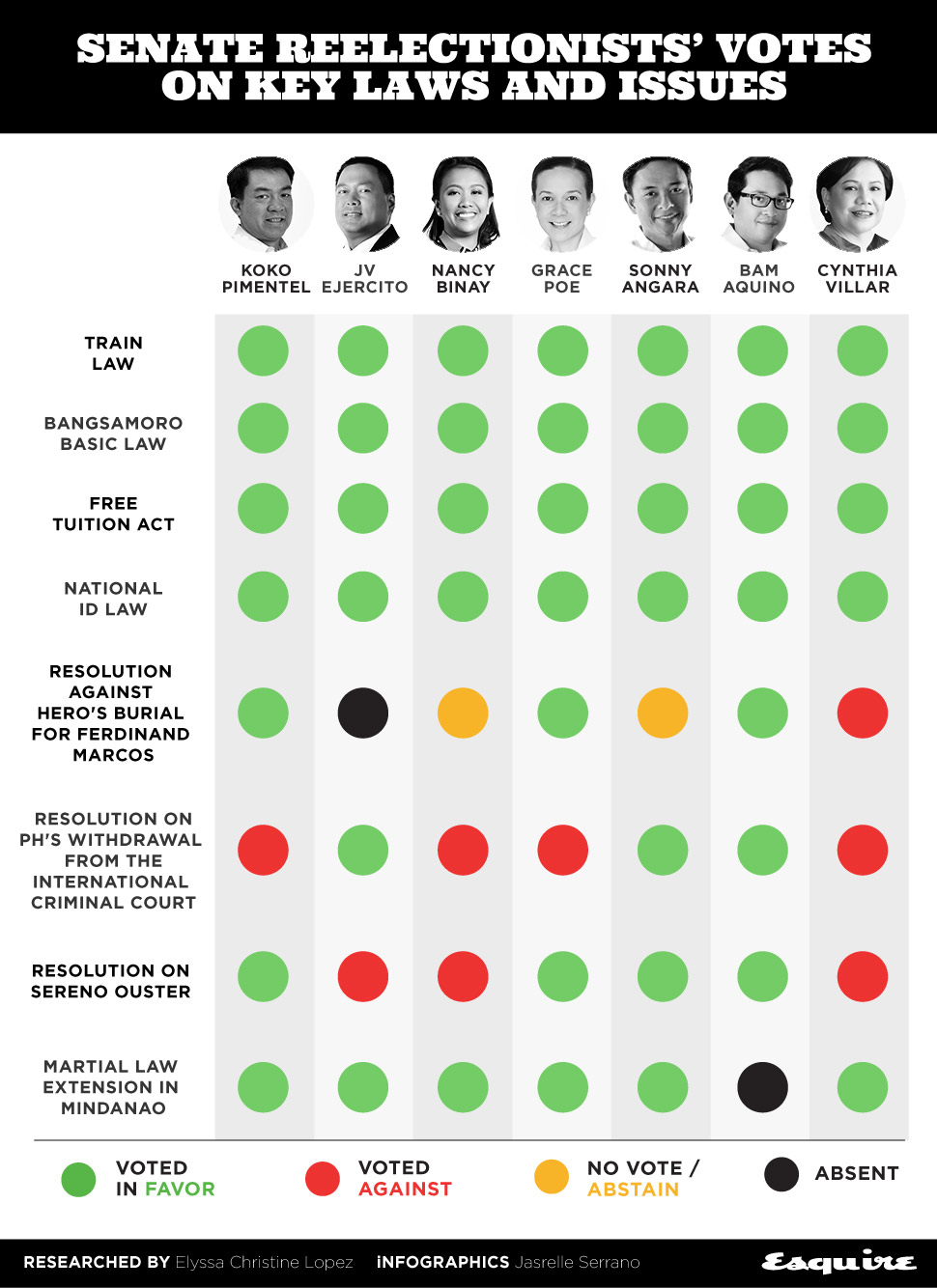Nowadays, seeing a campaign poster out on the streets is no longer surprising. Many candidates have been boosting their posts and videos online to raise awareness, as a way of saying, hey, I’m running for a government position—again!
The culture of “popular voting” is now in full force. We can only hope that as election day approaches, more voters get to know their candidates better instead of getting swayed by campaign materials that do nothing but glorify and glamorize candidates without proper context.
To help you decide which candicates would best would serve your ideals and virtues, we tracked how the seven Senate reelectionists, Cynthia Villar, Paolo Benigno “Bam” Aquino, Sonny Angara, Aquilino “Koko” Pimentel III, Grace Poe, Nancy Binay, and Joseph Victor (JV) Ejercito, voted on some of the biggest laws and issues that hounded the legislative body in the past two years.

As seen in the infographic on this page, we listed four major national laws and another four resolutions that the Senate tried to pass, and charted how the seven legislators voted on each measure.
First on the list is the Tax Reform for Acceleration and Inclusion (TRAIN) law, which was sponsored in the Senate by Angara. All senatoriables voted in favor of the measure, but by mid-2018 both Ejercito and Aquino clamored for the law’s suspension.
The next three on the list—Bangsamoro Basic Law, the Free Tuition Act, and the National ID Law—are just some of the few measures that all senatoriablesagreed upon.
It was in the issuance of resolutions that the members of the Senate went at odds among each other.
In 2016, the President fulfilled his campaign promise of having late dictator Ferdinand Marcos laid to rest at the Libingan ng mga Bayani but it was not without strong opposition from critics and martial law victims. The Senate tried to issue Resolution 86, which argued how the former President was “unfit” to be buried among heroes and soldiers, but it failed to get the majority vote.
ADVERTISEMENT – CONTINUE READING BELOW
Senate reelectionists Pimentel, Poe, and Aquino were among the minority then, with Villar the lone senatoriable who supported the idea. The rest, including Binay, Ejercito, and Angara, abstained from the vote.
The Senate also tried to challenge another decision, this time by the Supreme Court, when it removed former Chief Justice Maria Lourdes Sereno from her seat through a quo warranto plea in May 2018. While it was signed by 14 out of the 23 Senators present during its vote, Senate Resolution 738 was never adopted. The resolution questioned the Supreme Court’s decision, which it said violated the Constitution.
The Constitution states that the House of Representatives has the exclusive power to initiate all cases of impeachment while the Senate has the sole power to try and decide these cases.
Almost all Senate reelectionists signed the proposed resolution save for Ejercito and Binay.
Before 2018 ended, the Senate also voted on the extension of martial law in Mindanao. All of the reelectionists voted in favor of the move, except for Aquino, the lone opposition on the list.
But if there’s a resolution on the list that still has the potential to change major policies, it would be Resolution 289, which “expresses the sense” of the chamber that it has a say on whether the country’s participation in any treaty or international agreement has terminated.
In March, the Duterte administration withdrew the country from the International Criminal Court (ICC) after one of its prosecutors declared that it has started its investigation on the President and other top officials for their alleged hand in crimes against humanity with the war on drugs.
Under ICC rules, the withdrawal will only be deemed effective a year after the petitioner’s request has been submitted.
Since the administration made such a move, critics have reiterated that the President cannot withdraw from the high court “on his own.” The constitution states that “No treaty or international agreement shall be valid and effective unless concurred in by at least two-thirds of all the Members of the Senate.” It’s the lone provision that Senate Resolution 289 hopes to uphold, however, it remains to be unadopted.
ADVERTISEMENT – CONTINUE READING BELOW
Only Aquino, Angara and Ejercito signed the resolution among the reelectionists.
Source link
 DRIVE STARTUPS We Present Latest Startup News, Tips & Inspiration
DRIVE STARTUPS We Present Latest Startup News, Tips & Inspiration

